THE TWELVE CAESARS
ACTA ACCLA, April 2005
TITUS
Emperor 79 - 81 CE
Text by Ken Baumheckel
Titus (full name, Titus Flavius Sabinus Vespasianus), the elder son of Emperor Vespasian, both destroyed Jerusalem and completed the Colosseum. He was born December 30, 39 CE and ruled as emperor of the Roman world from 79 to 81. During that brief reign, he administered aid to the victims of the eruption of Mount Vesuvius (79 CE) and completed and dedicated (80 CE) the Flavian amphitheater, later called the Colosseum, begun by his father.

Emperor Titus
Bust in the British Museum

Emperor Titus
Bust in the Louvre
Prior to becoming emperor, Titus served as a military tribune in Germany and Britain and later fought under his father's command during the Jewish rebellion in Palestine. After Vespasian became emperor in 69, Titus was left in command of the Roman army in Palestine, and he brought the war to a close with the capture and destruction of Jerusalem in 70 CE. To commemorate this victory in the Jewish war, his brother, Emperor Domitian (ruled 81-96 CE), later erected the Arch of Titus. That monument survives and gives us a visual record of some of the sacred golden artifacts from the Jewish Temple service, including the famous seven-branched lamp stand.
Titus is one of the enigmas of history. Aside from his cruel prosecution of the war against the Jews that resulted in the destruction of Jerusalem, he had a low reputation for partying late into the night and for forgery of incriminating letters to secure convictions of political opponents. Yet it is clear that he was well-loved in his career as emperor.
He became popular with the Roman people due to his handling of the Vesuvius tragedy (like a modern governor, he didn't just pour disaster relief into the stricken area but visited it twice, immediately following the eruption and again the following year) and also of a great fire and plague in Rome (80 CE). Titus went beyond rebuilding Rome and authorized generous gifts and lavish entertainments. Moreover, he established a lenient government, discontinuing all prosecutions for laesa majestas or treason by disrespect, and decreeing heavy punishments against informers.
He died of a fever, probably caused by malaria, on September 13, 81 CE.
SUGGESTED WEB RESOURCES ON TITUS
Titus Flavius Vespasianus on De Imperatoribus Romanis
Suetonius, The Lives of the Caesars - The Life of Titus (English)
Suetonius, De Vita Caesarum - DIVVS TITVS (Latin)


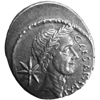 Julius Caesar
Julius Caesar Augustus
Augustus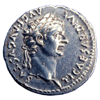 Tiberius
Tiberius Caligula
Caligula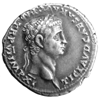 Claudius
Claudius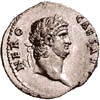 Nero
Nero Galba
Galba Otho
Otho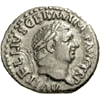 Vitellius
Vitellius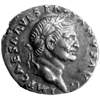 Vespasian
Vespasian Titus
Titus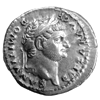 Domitian
Domitian
